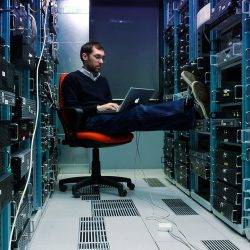October 25, 2017
Security and skills are the top concerns for companies investing in new technology
 Over the next five years, the top three technologies that are set to move from the fringes to the business mainstream are Artificial Intelligence (AI), Blockchain and the Internet of Things, according to CBI research. In the CBI’s new report, Disrupting the future, the UK business group highlights how firms and the government must pave the way for adoption of cutting-edge technologies, tackling the barriers that businesses are facing. The CBI is calling on the Government to establish a joint commission in early 2018 involving, business, employee representatives, academics and a Minister, to examine the impact of Artificial Intelligence on people and jobs, setting out plans for action that will raise productivity, spread prosperity and open up new paths to economic growth.
Over the next five years, the top three technologies that are set to move from the fringes to the business mainstream are Artificial Intelligence (AI), Blockchain and the Internet of Things, according to CBI research. In the CBI’s new report, Disrupting the future, the UK business group highlights how firms and the government must pave the way for adoption of cutting-edge technologies, tackling the barriers that businesses are facing. The CBI is calling on the Government to establish a joint commission in early 2018 involving, business, employee representatives, academics and a Minister, to examine the impact of Artificial Intelligence on people and jobs, setting out plans for action that will raise productivity, spread prosperity and open up new paths to economic growth.










 Emerging technologies such as artificial intelligence, robotics, virtual reality, augmented reality and cloud computing, will transform our lives and how we work over the next decade; and by 2030 every organisation will be a technology organisation. As such businesses need to start thinking today about how to future-proof their infrastructure and workforce, according to a report published by Dell Technologies. The research, led by the Institute for the Future (IFTF) alongside 20 technology, academic and business experts from across the globe also offers insight on how consumers and businesses can prepare for a society in flux. ‘
Emerging technologies such as artificial intelligence, robotics, virtual reality, augmented reality and cloud computing, will transform our lives and how we work over the next decade; and by 2030 every organisation will be a technology organisation. As such businesses need to start thinking today about how to future-proof their infrastructure and workforce, according to a report published by Dell Technologies. The research, led by the Institute for the Future (IFTF) alongside 20 technology, academic and business experts from across the globe also offers insight on how consumers and businesses can prepare for a society in flux. ‘
 Three quarters (75 percent) of businesses expect to increase the number of high-skilled roles over the coming years, but 61 percent fear that there will be a lack of sufficiently skilled people to fill them. This is according to the 2017 CBI/Pearson Education and Skills Survey which highlighted that 62 percent see strong competition for candidates with appropriate qualifications as the most widespread cause of skills shortage, followed by a lack of candidates with appropriate qualifications (55 percent). According to the report, while the Brexit debate generates plenty of heat, ‘it’s the white heat of technological change that will mean huge change to the jobs of 2030’. Add that to the obvious question about what skills we’ll need to ‘home grow’ in the absence of free labour movement, and the skills gap is brought into sharper relief argues the report.
Three quarters (75 percent) of businesses expect to increase the number of high-skilled roles over the coming years, but 61 percent fear that there will be a lack of sufficiently skilled people to fill them. This is according to the 2017 CBI/Pearson Education and Skills Survey which highlighted that 62 percent see strong competition for candidates with appropriate qualifications as the most widespread cause of skills shortage, followed by a lack of candidates with appropriate qualifications (55 percent). According to the report, while the Brexit debate generates plenty of heat, ‘it’s the white heat of technological change that will mean huge change to the jobs of 2030’. Add that to the obvious question about what skills we’ll need to ‘home grow’ in the absence of free labour movement, and the skills gap is brought into sharper relief argues the report.




















May 3, 2017
Wiring your brain to the Internet? What could possibly go wrong? 0
by Christopher Markou • Comment, Technology, Wellbeing
(more…)